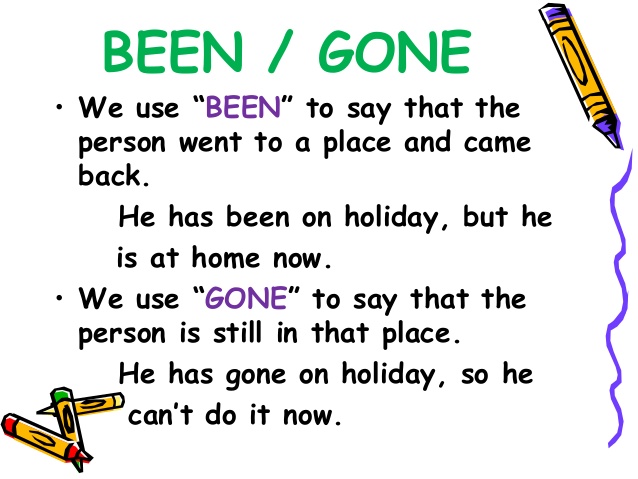(单词翻译:单击)
Now in this video, I talked about the present perfect and I explained that the present perfect can be used to talk about life experience
在这段视频中,我们讨论了现在完成时,我也解释了可以用现在完成时来讨论生活经历,
or it can be used to talk about an unfinished action in the past, that is somehow affecting the present moment.
或者也可以用来讨论在过去未完成的动作,这个动作在某种程度上对现在产生影响。
So usually, that unfinished action started recently in the past and is still happening in the present.
因此,通常情况下,这个未完成的动作是在过去且最近才开始的,现在仍在进行中。
That past action is affecting the present moment.
过去的动作正在影响现在。
So these grammatical differences can help you when you're choosing whether to use 'been' or 'gone'.
因此,当你选择使用“been”还是“gone”时,这些语法差异可以帮助你。
So use 'been' when it's something that happened in the past.
但某事在过去发生时,使用“been”。
It's part of your life experience and it's finished.
这件事是你生活经历的一部分,而且已完成了。
I've been to Spain.
我去过西班牙。(I've been to Spain.)
I'm not there now but it is part of my life experience.
我现在不在那,但这是我生活经历的一部分。
If it's about life experience then 'been' is usually the correct choice.
如果是关于生活经历时,“been”通常会是正确选择。
Now 'gone' is the one to use when it's an unfinished action that started in the past and affects the present moment.
“gone”用在一段未完成的行动,过去开始,影响现在。
My mum has gone to Spain.
我妈妈去了西班牙。(My mum has gone to Spain.)
She's not here now.
她现在不在这里。
It's a past action that is affecting the present and it's unfinished.
这是过去的行为,对现在有影响,这个行动未完成。
So there are some common mistakes that English learners need to avoid when they're choosing between 'been' and 'gone'.
因此,当英语学习者在“been”和“gone”之间进行选择时,需要避免一些常见的错误。
So for you, don't use 'gone' when you're talking about yourself.
所以对你来说,要讨论你自己时,不要用“gone”。
I've gone to Japan.
我去了日本。(I've gone to Japan.)
No I haven't, because I'm right here, I'm not in Japan.
不,我没有,因为我就在这,我不在日本。
You also can't use 'gone' to talk about someone else who is actually with you at the time of speaking.
你也不能用“gone”来谈论在你说话的时候和你在一起的其他人。
It just doesn't make any sense.
只是没有任何意义。

Most of the time, ever and never are used to talk about life experience.
大多数时候,从来没有,也从来没有被用来谈论生活经验。
So usually, they are used with 'been' instead of 'gone'.
所以通常情况下,会用“been”而不用“gone”。
Have you ever been to Australia?
你去过澳大利亚吗?
I've never been to Russia.
我从没去过俄罗斯。
Okay, so are you ready to practise a little with me?
好了,你准备好和我进行一些练习了吗?
You need to choose 'been' or 'gone'.
你要选择“been”或“gone”。
Tim has ... to Melbourne for the weekend. He'll be back on Monday.
蒂姆……墨尔本度周末。(Tim has ... to Melbourne for the weekend.)他星期一回来。
What do you think?
你觉得选哪个?
Which verb is the correct verb?
哪个动词是对的?
Tim has gone to Melbourne for the weekend. He'll be back on Monday.
蒂姆去了墨尔本度周末。(Tim has gone to Melbourne for the weekend.)他星期一回来。
He's not here right now so he hasn't returned yet.
他现在不在这,所以他还没回来。
He's still there, he's still in Melbourne.
他仍然在那,他还在墨尔本。
Has your dad ever .... to India with you?
你爸爸和你一起……印度吗?(Has your dad ever .... to India with you?)
Has your dad ever been to India with you?
你爸爸和你一起去过印度吗?(Has your dad ever been to India with you?)
We're talking about life experience here, so we would probably choose 'been'.
我们在这句话讨论的是生活经历,所以我们会选择“been”。
Jessica has ... to the supermarket already.She bought some fruit for our picnic tomorrow.
杰西卡已经……超市。她为我们明天的野餐买了些水果。
Which one is it?
选哪个?
Been or gone.
been还是gone。
Jessica has been to the supermarket already. She's bought some fruit for our picnic tomorrow.
杰西卡已经去过超市了。(Jessica has been to the supermarket already.)她为我们明天的野餐买了些水果。
It must be 'been' because we know what she bought so she must have come back from the supermarket and told us.
一定是选“been”,因为我们知道她买了什么,所以她一定从超市回来了,并且告诉我们了。
Okay well I hope that that lesson was useful for you
好吧,希望这节课对你有用。
Just remember that 'been' is used to talk about life experience, about trips and events and things that have happened in the past but are not still happening now.
要记住,“been”是用来谈论生活经历、旅行和事件以及过去发生但现在没有发生的事情。
And 'gone' is used to talk about a current trip or event when someone is somewhere else, they haven't returned yet.
“gone”是用来谈论当前的旅行或事件,当某人在其他地方,他们还没有回来的时候。
If you enjoyed this lesson, make sure you subscribe to the mmmEnglish Channel just down there.
如果你喜欢这节课,一定要在下面订阅我们的mmmEnglish频道。
I make a new English lesson every week and if you subscribe you'll find out as soon as it's ready for you.
我每周都上一节新的英语课,如果你订阅的话,课一准备好你就知道了。
Right now, you should probably check out this lesson right here, about the present perfect so that you can practise what you've already learnt in this lesson.
现在,你应该看看这节课,关于现在完成时,这样你就可以练习你在这节课上已经学到的东西。
Or you can check out some other lessons right here.
或者你也可以在这里看看其他课程。
Thanks for watching and I'll see you again next week.
感谢收看,下周见。
Bye for now.
再见啦。


